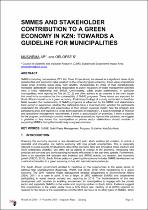 ResearchSpace
ResearchSpace
SMMEs and stakeholder contribution to a Green Economy in KZN: Towards a guideline for municipalities
JavaScript is disabled for your browser. Some features of this site may not work without it.
- ResearchSpace
- →
- Research Publications/Outputs
- →
- Journal Articles
- →
- View Item
| dc.contributor.author |
Muswema, Aubrey P

|
|
| dc.contributor.author |
Oelofse, Suzanna HH

|
|
| dc.date.accessioned | 2023-03-31T14:26:15Z | |
| dc.date.available | 2023-03-31T14:26:15Z | |
| dc.date.issued | 2021-03 | |
| dc.identifier.citation | Muswema, A.P. & Oelofse, S.H. 2021. SMMEs and stakeholder contribution to a Green Economy in KZN: Towards a guideline for municipalities. http://hdl.handle.net/10204/12707 . | en_ZA |
| dc.identifier.isbn | 978-1-928535-55-3 | |
| dc.identifier.uri | http://hdl.handle.net/10204/12707 | |
| dc.description.abstract | SMMEs (including cooperatives, PTY Ltd, Close Corporations) are viewed as a significant driver of job opportunities and economic value creation; in the context of green economy, these value propositions would entail diverting waste away from landfills. Municipalities by virtue of their constitutionally mandated ‘gatekeeper’ status being responsible as policy regulators of waste management activities have a tricky relationship with SMME. Unfortunately, public sector stakeholders, in particular municipalities, were reported by The dti (2012) and other authors to be unaware of the main issues that need to be considered for the sustainability of SMME programs. These issues are important for South Africa’s transition to a green economy. Preliminary findings of a study conducted in KwaZuluNatal revealed that sustainability of SMMEs programs is influenced by the SMME and stakeholders track record or experience, whether the participants have a local foot print, whether the participants understand the strengths and weaknesses of their chosen business model, how the program and participants grow and expand (i.e. a top down approach or organically), a basic knowledge of financial and operational management requirements, if there is accountability on promises, if there is passion for the program, and through constant review of these associations. Against this backdrop, we suggest a guideline or key issues that municipalities or private sector stakeholders should consider in supporting SMMEs during the transitioning to a green economy. | en_US |
| dc.format | Fulltext | en_US |
| dc.language.iso | en | en_US |
| dc.relation.uri | https://www.wastecon.co.za/index.html | en_US |
| dc.relation.uri | https://iwmsa.co.za/downloads/WasteCon%202020%20Proceeding%20-%20USB%2017%20March%202021.pdf | en_US |
| dc.source | WasteCon 2020, Emperors Place, Gauteng, 9-11 February 2021 | en_US |
| dc.subject | Solid Waste Management | en_US |
| dc.subject | Green economy | en_US |
| dc.subject | Municipalities | en_US |
| dc.subject | SMME's | en_US |
| dc.title | SMMEs and stakeholder contribution to a Green Economy in KZN: Towards a guideline for municipalities | en_US |
| dc.type | Conference Presentation | en_US |
| dc.description.pages | 10 | en_US |
| dc.description.note | Paper presented at WasteCon 2020, Emperors Place, Gauteng, 9-11 February 2021 | en_US |
| dc.description.cluster | Smart Places | en_US |
| dc.description.impactarea | Waste Benefication | en_US |
| dc.identifier.apacitation | Muswema, A. P., & Oelofse, S. H. (2021). SMMEs and stakeholder contribution to a Green Economy in KZN: Towards a guideline for municipalities. http://hdl.handle.net/10204/12707 | en_ZA |
| dc.identifier.chicagocitation | Muswema, Aubrey P, and Suzanna HH Oelofse. "SMMEs and stakeholder contribution to a Green Economy in KZN: Towards a guideline for municipalities." <i>WasteCon 2020, Emperors Place, Gauteng, 9-11 February 2021</i> (2021): http://hdl.handle.net/10204/12707 | en_ZA |
| dc.identifier.vancouvercitation | Muswema AP, Oelofse SH, SMMEs and stakeholder contribution to a Green Economy in KZN: Towards a guideline for municipalities; 2021. http://hdl.handle.net/10204/12707 . | en_ZA |
| dc.identifier.ris | TY - Conference Presentation AU - Muswema, Aubrey P AU - Oelofse, Suzanna HH AB - SMMEs (including cooperatives, PTY Ltd, Close Corporations) are viewed as a significant driver of job opportunities and economic value creation; in the context of green economy, these value propositions would entail diverting waste away from landfills. Municipalities by virtue of their constitutionally mandated ‘gatekeeper’ status being responsible as policy regulators of waste management activities have a tricky relationship with SMME. Unfortunately, public sector stakeholders, in particular municipalities, were reported by The dti (2012) and other authors to be unaware of the main issues that need to be considered for the sustainability of SMME programs. These issues are important for South Africa’s transition to a green economy. Preliminary findings of a study conducted in KwaZuluNatal revealed that sustainability of SMMEs programs is influenced by the SMME and stakeholders track record or experience, whether the participants have a local foot print, whether the participants understand the strengths and weaknesses of their chosen business model, how the program and participants grow and expand (i.e. a top down approach or organically), a basic knowledge of financial and operational management requirements, if there is accountability on promises, if there is passion for the program, and through constant review of these associations. Against this backdrop, we suggest a guideline or key issues that municipalities or private sector stakeholders should consider in supporting SMMEs during the transitioning to a green economy. DA - 2021-03 DB - ResearchSpace DP - CSIR J1 - WasteCon 2020, Emperors Place, Gauteng, 9-11 February 2021 KW - Solid Waste Management KW - Green economy KW - Municipalities KW - SMME's LK - https://researchspace.csir.co.za PY - 2021 SM - 978-1-928535-55-3 T1 - SMMEs and stakeholder contribution to a Green Economy in KZN: Towards a guideline for municipalities TI - SMMEs and stakeholder contribution to a Green Economy in KZN: Towards a guideline for municipalities UR - http://hdl.handle.net/10204/12707 ER - | en_ZA |
| dc.identifier.worklist | 24280 | en_US |





